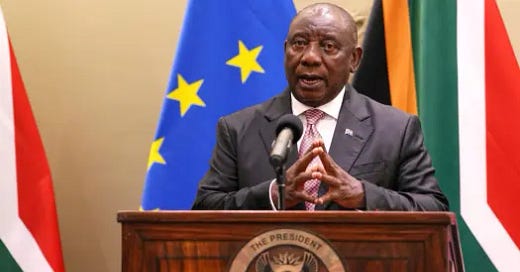South African President Cyril Ramaphosa signed the Expropriation Bill of 2024 into law in January 2025, following months of debate in the parliament between the African National Congress (ANC) and the Democratic Alliance (DA), who are the major partners in the coalition government. The law follows a five-year process of consultation and a presidential panel established to investigate the issue.
The law allows for the seizure of land from any private owner, regardless of race or color, for public purposes and public interest, including land reform, the equitable distribution of resources, environmental conservation, infrastructure development, and situations in which the property is not being used and there is no intention to develop it. The law calls for just compensation to the owners, without providing an objective parameter for determining a fair price, such as tax returns from the previous year. It also allows for seizure of land or property without compensation in certain cases, including a situation in which negotiations for reasonable settlement have failed.
The new law replaces the Expropriation Law of 1975, which had been the basis for the government’s “willing buyer, willing seller” policy that permitted white farmers to refuse to sell their land. “This policy has so far allowed property owners to block redistribution efforts, as it allows property owners to refuse to have their property expropriated and also allows them to hold the government to ransom by demanding that the state pay exorbitant prices for property intended for expropriation,” according to constitutional expert Pierre de Vos, quoted in a 2013 BBC article by Pumza Fihlani (“Can South Africa avoid doing a Zimbabwe on land?”, June 24, 2013). With this context in mind, the African National Congress defends the new law as a “significant milestone” in the transformation of South Africa.
The slow pace of land reform in South Africa is driven not only by the unwillingness of white farmers to sell their land, but also by limited interest in farming among blacks. Many blacks whose families were forced off the land during apartheid have opted for restitution in the form of cash payments, which the government says is a consequence of urbanization, poverty, unemployment, and a need for money. At the same time, many beneficiaries who opted to take back the land of their families have not developed successful farms, due to insufficient knowledge and experience in farming or its business dimensions as well as a lack of capital; many are not farming the land at all, or are doing so only on a small part of the land.
The South African Sugarcane Association, seeking to secure the future of the industry in South Africa, developed its own land-reform program, based on cooperation between established white farmers and the new black farmers that have benefitted from the land reform. Fihlani reported that fifth-generation sugar-cane farmer Alan Bruscow has been training his new neighbors, thirty-six black farmers who were awarded land through the land reform policy. The success of this project, although small, underscores the limitations of the government’s land reform policy, which ought to be more comprehensive, providing training, technical support, favorable financial terms, and markets for new farmers.
Some Afrikaner groups maintain that the 2025 Expropriation Law is legally unclear and lacking in clear compensation procedures. Afrikaners, descendants of Dutch and other European colonial settlers who first came to the area more than 300 years ago, believe that it could result in their land being confiscated without compensation, and that it could provoke a sharp decrease in property values. Afrikaners today make up many of the nation’s farming communities, and they own a large number of commercial farms.
The Democratic Alliance rejects the Expropriations Law on the grounds that “no government in a democratic country should be given such sweeping powers to expropriate property without compensation.” It launched a legal challenge on February 10, seeking the nullification of the law.
The Democratic Alliance is a white-led political party, drawing support from all races. It is the largest white-led political party in South Africa. It was a party of opposition to the ANC in post-apartheid South Africa, but when the ANC did not attain an outright majority in 2024 for the first time since 1994, DA joined a multi-party governing coalition headed by the ANC.
In 2022, the World Economic Forum warned that the South African government could collapse, as a result of record levels of unemployment, high crime rates, unsustainable state spending, mismanaged institutions, and corruption. In the 2024 elections, the ANC received 40% of the vote, a drop of 17%, and it lost seventy seats in the parliament. DA received 22% of the vote, constituting itself as the second largest party. The pro-business, free-market orientation of DA placed it in ideological disagreement with the social welfare orientation of the ANC. But the two largest parties were able to agree on a national unity government, based in a common commitment to improving the delivery of basic services like water and power, further developing the infrastructure, and creating jobs. The Economic Freedom Fighters, with 10% of the vote, and other Leftist and populist parties did not join the national unity coalition.
Upon beginning his second term of office in 2024, President Ramaphosa announced that the coalition government was committed to reversing inequalities and growing the economy. At the same time, he declared that “our society remains deeply unequal and highly polarized. . .. There are toxic cleavages and an incipient social fragmentation that can easily turn into instability.”
In the remainder of today’s commentary, I discuss the failure of the ANC to adequately address the land question, the emergence of the Economic Freedom Fighters, and the granting of refugee status by the Trump administration to Afrikaners.



